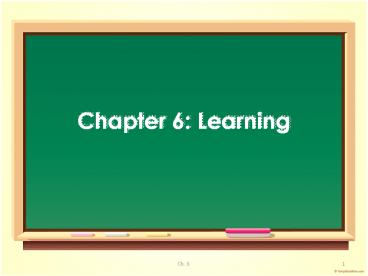Chapter 6: Learning - PowerPoint PPT Presentation
1 / 28
Title:
Chapter 6: Learning
Description:
Observational Learning: ... Observational learning through modeling Models: ... Behaviorism Operant Conditioning Escape and avoidance learning Operant ... – PowerPoint PPT presentation
Number of Views:250
Avg rating:3.0/5.0
Title: Chapter 6: Learning
1
Chapter 6 Learning
2
Learning
- Relatively permanent change in behavior due to
experience - 1. Classical Conditioning Pairing
- 2. Operant Conditioning Consequence
- 3. Observational Learning Watching
3
Classical Conditioning
- Ivan Pavlov we learn to associate two stimuli by
pairing (experiments w/ dogs)
4
Classical Conditioning
- Unconditioned Stimulus (UCS) Stimulus coming
from the environment that naturally triggers a
response (automatic) - Unconditioned Response (UCR) Reflex to the UCS,
unlearned/naturally/automatically - Neutral Stimulus (NS) has no relationship to the
UCS or UCR but later gains power to trigger the
CR - Conditioned Stimulus (CS) aka previously neutral
stimulus, through pairing w/ UCS becomes learned
triggers the CR - Conditioned Response (CR) learned response to
the conditioned stimulus
5
Classical Conditioning Terminology
Acquisition The initial stage of learning
Elicited Brings out either automatically or
involuntarily Trial Pairing of the UCS NS
6
Classical Conditioning of a Fear Response
7
Processes in Classical Conditioning
- Extinction presenting the CS alone w/out UCS
causing weakening/disappearance - Spontaneous Recovery reappearance of behavior,
after a period of no exposure - Stimulus Generalization responding to similar
stimuli - Discrimination responding to only a specific
stimuli
8
Acquisition, Extinction Spontaneous Recovery
9
Variations in Classical Conditioning
- Stimulus Contiguity occurring together in time
and space - Higher-Order Conditioning building on an already
conditioned behavior, to associate another
conditioned stimulus. (1st to sound, then to
color) - Renewal Effect if extinguished in another place,
reappearance of the behavior if you return to the
original environment
10
Higher-order conditioning
11
Classical Conditioning Behaviorism
- John B. Watson behavior learned through..
- Little Albert classically conditioned a baby to
fear a white rat, then any small fluffy thing. - UCS Generalization?
- UCR Discrimination?
- NS Reversible?
- CS
- CR
12
Operant Conditioning
- Operant Conditioning learning that is controlled
by consequences - Edward L. Thorndike (1913)
- Law of Effect behaviors followed by favorable
consequences become more likely vice versa - Puzzle Box experiments w/ Cats taught escape
learning
13
Escape and avoidance learning
14
Operant Conditioning
- B.F. Skinner (1953) principle of reinforcement
- Operant Chamber (Skinner Box) complex or
voluntary behaviors controlled my a machine - Emission of response voluntary
- Reinforcement Contingencies rules
- Cumulative Recorder graphs responses
15
Skinner Box Cumulative Recorder
16
Basic Processes in Operant Conditioning
- Acquisition first time you learn
- Shaping reinforcing behavior that is close too
the desired goal - Extinction weakening/disappearance of a response
(no consequence - Discriminative Stimuli cues that influence
behavior (asking when in a good mood)
17
Comparison of Basic Classical Operant
Conditioning
18
Consequences that Strengthen Responses
- Primary Reinforcers
- Satisfy biological needs (needs)
- Secondary Reinforcers
- Conditioned reinforcement (wants)
19
Schedules of Reinforcement
- Continuous reinforcement
- Intermittent (partial) reinforcement
- (leads to more resistance to extinction)
- Ratio schedules Based on Response
- Fixed Ratio
- Variable Ratio
- Interval schedules Based on Time
- Fixed Interval
- Variable Interval
20
Schedules of Reinforcement
21
ConsequencesReinforcement Punishment
Positive () Something Given Reinforcement Behavior Increases
Negative (-) Something Taken Punishment Behavior Decreases
22
Positive Reinforcement Negative Reinforcement
23
Negative Reinforcement Punishment
24
ConsequencesReinforcement Punishment
- Positive Reinforcement
- Negative Reinforcement
- Escape learning learn to end aversion
- Avoidance learning learn to prevent
- Positive Punishment
- Negative Punishment
- Problems with punishment
25
New Operant Conditioning Ideas
- Conditioned Taste Aversion John Garcia,
taste-nausea odder-nausea are impossible to
prevent
26
Conditioned Taste Aversion
27
Observational Learning
- Albert Bandura Observational learning through
modeling - Models people who demonstrate the behavior
- 4 key processes
- attention
- retention
- reproduction
- motivation
28
Observational learning































